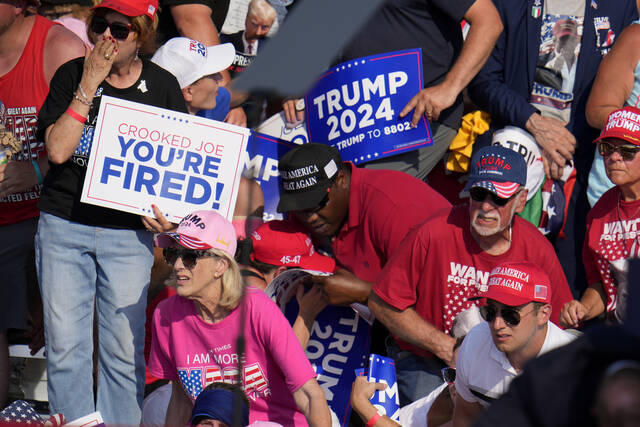Conspiracy theories spread wildly online after Trump shooting — including by members of Congress
Misinformation has spread widely in the wake of the attempted assassination of former President Donald Trump.
A whirlwind of conflicting conspiracy theories has blown across social media since the shooting Saturday by gunman Thomas Matthew Crooks, 20, of Bethel Park.
Right-wing social media users claimed baselessly that Biden and the deep state were behind it, or, as the Kremlin said, they created the atmosphere that provoked the attack. Others on the left asserted it was staged by Trump supporters carrying out a “false flag operation,” perhaps using fake blood, to elicit sympathy and votes. Yet another theory was that the media is to blame for a near-deadly overdose of negative Trump narratives that triggered the violence. Ultimately, however, it may have been the Chinese, or Antifa, other conspiracy theorists claimed.
A few politicians on the right were among those engaging in the conspiracy mongering.
Not long after the shooting Saturday, U.S. Rep. Mike Collins, R-Ga., posted on X that “Joe Biden sent the orders, ” referencing the shooting. Late Sunday afternoon — garnering more than 7 million views — the post was somewhat altered, reading “The Republican District Attorney in Butler County, PA, should immediately file charges against Joseph R. Biden for inciting an assassination.”
As for the Democrats, no left-leaning politicians appeared to go on record blaming Trump people for staging the shooting. But the idea did have popularity on social media.
Democratic strategist Dmitri Mehlhorn, adviser to Democratic political donor Reid Hoffman, purportedly wrote, “If any Trump officials encouraged or knew of this attack, that is morally horrific, and Republicans of decency must demand that Trump step down as unfit,” according to the news website Semafor. On Sunday, Mehlhorn apologized, saying he now regrets the email, Semafor reported.
Meanwhile, actress and activist Andrea Seales posted on X that the shooting “was more staged than a Tyler Perry production of Medea Runs for President.”
On Sunday afternoon, President Joe Biden warned against rushing to baseless conclusions about the gunman’s motivations before the FBI completes its investigation.
“I urge everyone, everyone, please don’t make assumptions about his motives or his affiliations,” Biden said. “Let the FBI do their job, and their partner agencies do their job. I’ve instructed that this investigation be thorough and swift, and the investigators will have every resource they need to get this done.”
A major news event such as the attempted assassination of a presidential candidate is expected to generate an enormous amount of misinformation (mistaken facts being disseminated), as well as disinformation (incorrect or faked information and videos purposely posted).
Because so many questions about what happened and why are still swirling, we will likely see two things, said Matthew Stamm, director of the Multimedia Information and Security Lab at Drexel University: “People innocently speculating in online items that will then be inaccurately interpreted as fact. And bad actors, foreign and domestic, attempting to influence the American public.”
Asked what misinformation about the Trump shooting we can expect in the coming hours and days, Stamm of Drexel said, “More. I don’t know particularly, but, yes, a lot more.”
That individuals on social media are espousing endless numbers of conspiracy theories is nothing new. They flare up when people are scared and confused, according to University of Pittsburgh historian Lara Putnam, faculty affiliate with the school’s Institute for Cyber Law Policy and Security.
Psychologically, such theories can be both “scary and comforting,” she said.
Many conspiracy theories have known villains, Putnam said. Being able to think of a familiar figure perpetrating a frightening event — such as an assassination attempt — is far less worrisome than contemplating an evil, unknown person pulling the trigger. Thus, Putnam said, we’re currently seeing a proliferation of conspiracy theories that say Biden is behind the Trump shooting.
“For Trump supporters, saying Biden did it gives people ‘comforting fears,’” Putnam said. A shooting causes trepidation, of course, but it’s less scary if we think Biden ordered it because we already know him, and that he’s an adversary of Trump’s.
Sen. Tim Scott, R-S.C., a potential Trump running mate, released a statement on X saying, without evidence: “Let’s be clear: This was an assassination attempt aided and abetted by the radical Left and corporate media incessantly calling Trump a threat to democracy, fascists, or worse.”
Also on X, Republican Rep. Marjorie Taylor Greene of Georgia blamed the media as well, saying without foundation, “they demonized us” and “got what they wanted, an assassination attempt on President Trump and one of his supporters murdered.”
Conversely, Putnam said, people who distrust Trump are disposed to believing bad things about him, such as the the “false flag” conspiracy theory. “So,” Putnam said, “the shooting is scary, but it’s comforting to say Trump is really behind it because he’s already distrusted.”
Even people who work to understand and deny disinformation every day find themselves taking a step back to day to marvel at just how quickly bad ideas and inaccurate accounts can zip across the world in nanoseconds.
“‘A lie gets halfway around the world before the truth gets its pants on?’” said Penn State University misinformation expert Matt Jordan, quoting Winston Churchill. “Lies are coming from all over the place.”
Conspiracy theories about presidential shootings are common, but they spread faster now than they did 60 years ago.
There were private conversations among average citizens when JFK was assassinated, said David Kahl Jr., professor of communication and misinformation expert at Penn State Behrend in Erie on Sunday.
Today, we’re able to propagate information — and misinformation —very differently. “Any person with a keyboard and a screen can reach thousands, millions,” Kahl said. “We’re seeing today alone, it’s real easy to spread misinformation.”
Remove the ads from your TribLIVE reading experience but still support the journalists who create the content with TribLIVE Ad-Free.

